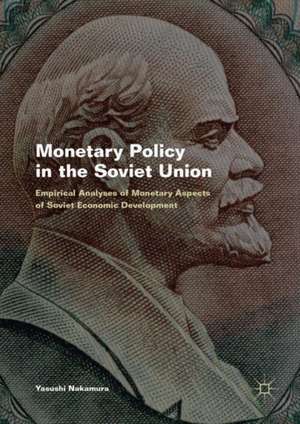Monetary Policy in the Soviet Union: Empirical Analyses of Monetary Aspects of Soviet Economic Development
Autor Yasushi Nakamuraen Limba Engleză Hardback – 8 aug 2017
Preț: 781.94 lei
Preț vechi: 953.58 lei
-18% Nou
Puncte Express: 1173
Preț estimativ în valută:
149.63€ • 156.62$ • 124.53£
149.63€ • 156.62$ • 124.53£
Carte tipărită la comandă
Livrare economică 31 martie-14 aprilie
Preluare comenzi: 021 569.72.76
Specificații
ISBN-13: 9781137494160
ISBN-10: 1137494166
Pagini: 222
Ilustrații: XVII, 222 p. 17 illus.
Dimensiuni: 148 x 210 mm
Greutate: 0.44 kg
Ediția:2017
Editura: Palgrave Macmillan US
Colecția Palgrave Macmillan
Locul publicării:New York, United States
ISBN-10: 1137494166
Pagini: 222
Ilustrații: XVII, 222 p. 17 illus.
Dimensiuni: 148 x 210 mm
Greutate: 0.44 kg
Ediția:2017
Editura: Palgrave Macmillan US
Colecția Palgrave Macmillan
Locul publicării:New York, United States
Cuprins
1. Introduction.- 2 Historical Background of the Soviet Monetary Policy.- 3. Soviet Productivity Growth.- 4 Performance of Soviet Cash Money Management.- 5 Soviet Banking and Non-cash Money Management.- 6 Money Supply and Soviet Foreign Trade.- 7 Soviet Monetary Policy and Government Debts.
Notă biografică
Yasushi Nakamura is a Professor at Yokohama National University, Japan.
Textul de pe ultima copertă
This book sheds light on the Soviet economic system, which claimed the eventual abolition of money, collapsed following a monetary turmoil. It argues that the cause of the economic collapse was embedded in the design of the economic system. The Soviet economic system restricted the market, but continued to use fiat money. Consequently, it faced the question for which no feasible answer seemed to exist: how to manage fiat money without data and information generated by the market? Using Soviet data newly available from the archives, the book evaluates the performance of the components of monetary management mechanism, discovers the continuous accumulation of open and secret government debts, and quantitatively analyzes the relationship between economic growth and the money supply to support the argument. The book concludes that the Soviet economic collapse marked the end of the long history of Soviet monetary mismanagement.
Caracteristici
Reveals new information on the Soviet Economic System Explores Soviet Union data Discusses Soviet Economic collapse and the significance behind it Includes supplementary material: sn.pub/extras
